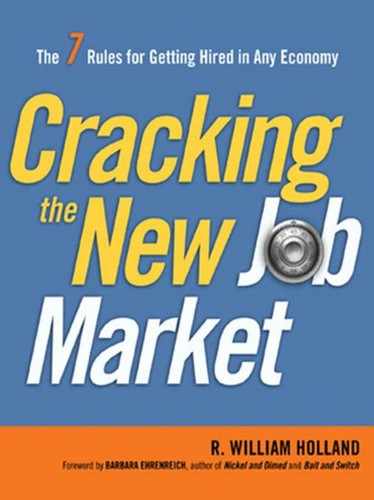FOREWORD
I first met Bill Holland in 2005, in Chicago, at a book signing for Bait and Switch—my attempt to understand and explain why otherwise perfectly qualified professionals were having difficulty finding work. Corporate downsizing was churning out tens of thousands of white-collar workers every year, but the resources available to people to help with the reemployment process didn’t make a lot of sense. It seemed to me that most of the coaching, networking groups, and the unemployment industry in general were part and parcel of one gigantic “bait and switch” scheme that too often did everything but help those who needed it the most. Unemployed white-collar workers had become a market for a host of dubious schemes, scams, and unhelpful self-help books and DVDs.
By the time my tour reached Chicago, it was clear that the themes of Bait and Switch resonated with substantial numbers of people who otherwise had no outlet for their concerns. Back then, no one wanted to believe that white-collar professionals were facing the same economic pressures more common to hourly workers. As I talked to different groups around the country, I began to ask who in the audience might be interested in organizing for purposes of giving voice to a new class of disaffected workers—white-collar America. That’s when United Professionals (UP) was born and Bill Holland stepped forward to become its chairman of the board.
Between 2006 and late 2010, UP reached out and touched thousands of people, many of whom shared their stories with us. Some had lost their homes, retirement savings, and any hope things would eventually get better. Most of the younger ones were laboring under more student debt than they could pay back in a lifetime. Many had given up on their professional careers and landed in low-paid service jobs. One of the more memorable notes we got was from a reporter for a major newspaper who had lost his job and health benefits at the very same time he learned about his wife’s breast cancer.
Those experiences touched all of us in profound ways. They confirmed the lack of an adequate social safety net for the unemployed, and UP put a lot of effort into advocating for extended unemployment benefits and health insurance that would not end when one’s job did. But our experience with unemployed white-collar people also highlighted the dearth of useful advice for individuals trying to deal with their own immediate crises.
Bill has a particularly sophisticated understanding of what is happening in the job market and what to do about it on a personal level. Trained as a political scientist, Bill is the author of three books and is a veteran corporate executive. As the chief human resources officer for the Business Process Outsourcing division for Andersen Consulting, he came face-to-face with the impact globalization and technology has on all of us—how it affects our pocketbooks and psychological well-being. All of that experience goes into his latest book, Cracking the New Job Market: The 7 Rules for Getting Hired in Any Economy, distilled into forceful, plainspoken English.
Bill understands that the world has changed. Safe jobs and lifelong careers are a thing of the past. Increasingly, the norm is for people to change jobs as many as nine times during a career and perhaps have three to four careers during the course of their lifetimes. Though the name of the game is still to hire the very best talent available, there is a gritty recognition that even the best talent is needed for only a finite period of time. Some of the most highly educated professionals (doctors, lawyers, engineers, among others) have seen their jobs reduced to temporary status.
At the same time, employers have drastically changed the way they recruit people. Rather than just running ads in the Wall Street Journal, companies are likely to have talent-acquisition strategies in which they tweet their openings, turn to their “fans” on Facebook, or search the rich database provided by LinkedIn. Techniques for job hunting have to change accordingly, but for the most part, the unemployment and career-management industry seems hell-bent in its commitment to the same methods that were in place twenty years ago.
In Cracking the New Job Market, Bill identifies, translates, and codifies the new rules for easy use by an increasingly weary class of workers. You can’t sit this one out and just wait for the economy to improve. There is growing evidence that we may be in for another jobless recovery. A lot of the jobs lost during these past few years have been relocated elsewhere in the world. Others—for example, in the print media—have simply disappeared. And competition for the jobs that remain will continue to intensify. Will you be ready?
I’ve learned an enormous amount from Bill. He knows how corporate America works—functionally and sometimes dysfunctionally—and has thought long and hard about how white-collar professionals can make it work for them. He’s smart; vastly well-informed; and, most important to me, never pulls a punch. With Cracking the New Job Market, I’m proud to share him with you.
